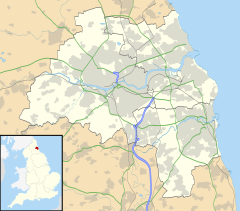Gateshead
| Gateshead | |
|---|---|
 Gateshead Waterfront |
|
| Gateshead shown within Tyne and Wear | |
| Population | 120,046 (2011 Census) |
| OS grid reference | NZ2460 |
| Metropolitan county | |
| Region | |
| Country | England |
| Sovereign state | United Kingdom |
| Post town | GATESHEAD |
| Postcode district | NE8, NE9, NE10, NE11, DH3 |
| Dialling code | 0191 |
| Police | Northumbria |
| Fire | Tyne and Wear |
| Ambulance | North East |
| EU Parliament | North East England |
| UK Parliament | |
Gateshead is a large town in Tyne and Wear, England, and the main settlement in the Metropolitan Borough of Gateshead. The local authority of Gateshead is also the Metropolitan Borough of Gateshead. Gateshead lay in County Durham, in 1835 the town became part of Gateshead County Borough. After the Local Government Act 1972, in 1974, Gateshead became part of the Gateshead Metropolitan Borough local authority, and part of the Tyne & Wear Metropolitan County. The town lies on the southern bank of the River Tyne opposite Newcastle upon Tyne. Gateshead and Newcastle are joined by seven bridges across the Tyne, including the Gateshead Millennium Bridge. The town is known for its architecture, including the Sage Gateshead, the Angel of the North and the Baltic Centre for Contemporary Art. Residents of Gateshead, like the rest of Tyneside, are referred to as Geordies. Gateshead's population in 2011 was 120,046.
Gateshead is first mentioned in Latin translation in Bede's Ecclesiastical History of the English People as ad caput caprae 'at the goat's head'. This interpretation is consistent with the later English attestations of the name, among them Gatesheued (c. 1190), literally 'goat's head' but in the context of a place-name meaning 'headland or hill frequented by (wild) goats'. Although other derivations have been mooted, it is this that is given by the standard authorities.
There has been a settlement on the Gateshead side of the River Tyne, around the old river crossing where the Swing Bridge now stands, since Roman times.
The first recorded mention of Gateshead is in the writings of the Venerable Bede who referred to an Abbot of Gateshead called Utta in 623. In 1068 William the Conqueror defeated the forces of Edgar the Ætheling and Malcolm king of Scotland (Shakespeare's Malcolm) on Gateshead Fell (now Low Fell and Sheriff Hill).
...
Wikipedia

